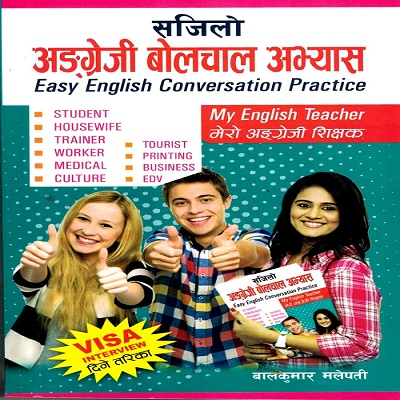




सजिलो अङ्ग्रेजी बोलचाल अभ्यास (Easy English Conversation Practice)
- SKU: 34515
- Availability: In stock
- Type: Non-Academic Book
सजिलो अङ्ग्रेजी बोलचाल अभ्यास
(Easy English Conversation Practice)
Author: बालकुमार मलेपती (Bal Kumar Malepati)
Language: Bilingual (English–Nepali)
Purpose: To help Nepali speakers learn practical spoken English for use in real-life situations, work, interviews, and travel.
? Topics & Sections in the Book Series
Each topic is covered with situational dialogues, vocabulary, and sentence patterns that match real-world communication needs:
1. STUDENT
English for school and college life.
Talking to teachers, friends, asking for help, giving opinions.
Examples:
“May I go to the library?”
“What did you learn today?”
2. HOUSEWIFE
Daily conversation at home and in the market.
Interacting with family, neighbors, and shopkeepers.
Examples:
“Let’s cook rice.”
“How much is this vegetable?”
3. TRAINER
Communication between a trainer and trainees.
Giving instructions, asking for feedback, conducting sessions.
Examples:
“Repeat after me.”
“What is your understanding of this topic?”
4. WORKER
English needed for manual laborers, security guards, helpers.
Workplace communication: reporting, following instructions, safety terms.
Examples:
“Where should I keep this box?”
“The machine is not working properly.”
5. MEDICAL
English for hospital, clinic, pharmacy settings.
Conversations between patient and doctor, nurse and attendant.
Examples:
“Where is the pain?”
“Take this medicine twice a day.”
6. CULTURE
English to explain Nepali culture, festivals, traditions.
Useful for guides, hosts, and cultural exchanges.
Examples:
“We celebrate Dashain in October.”
“This is a traditional Newari dress.”
7. TOURIST
Tourist-guide conversation in English.
Asking for and giving directions, booking, describing places.
Examples:
“Where is the nearest hotel?”
“This temple is 500 years old.”
8. PRINTING
Vocabulary and phrases for printing press or photocopy shop workers.
Example phrases:
“How many copies do you need?”
“Do you want it in color or black and white?”
9. BUSINESS
English for buying, selling, and customer service.
Talking about price, negotiation, delivery.
Examples:
“What is the wholesale rate?”
“We offer discounts on bulk purchases.”
10. EDV (Electronic Diversity Visa)
Phrases and vocabulary related to EDV application and interviews.
Filling forms, answering questions, and supporting documents.
Examples:
“Have you applied for the EDV before?”
“These are my academic certificates.”
? My English Teacher / मेरो अङ्ग्रेजी शिक्षक
A bilingual English learning guide written from the perspective of a helpful, friendly teacher.
Explains grammar, sentence formation, and common errors in Nepali context.
Includes:
Sentence translation exercises
Daily usage phrases
Practical tips for English learners
? VISA INTERVIEW दिने तरिका
(How to Give a Visa Interview)
Focused on US, Canada, Australia, and Schengen visa interviews.
Includes:
Frequently asked questions
Sample answers in English and Nepali
Confidence-building techniques
Do’s and don’ts in a visa interview
?️ अङग्रेजी बोलचाल
(English Conversation Method/Series)
Offers a systematic approach to learning English through practice, imitation, and repetition.
Emphasis on:
Listening and speaking more than grammar
Developing fluency through small, consistent steps
Sentence patterns for daily situations
✅ Key Features Across All Books
Bilingual Format (English with Nepali translation)
Simple, everyday language
Focus on spoken English, not theoretical grammar
Ideal for self-learners, job seekers, travelers, and beginners
Practical and usable in daily life, workplaces, schools, and interviews